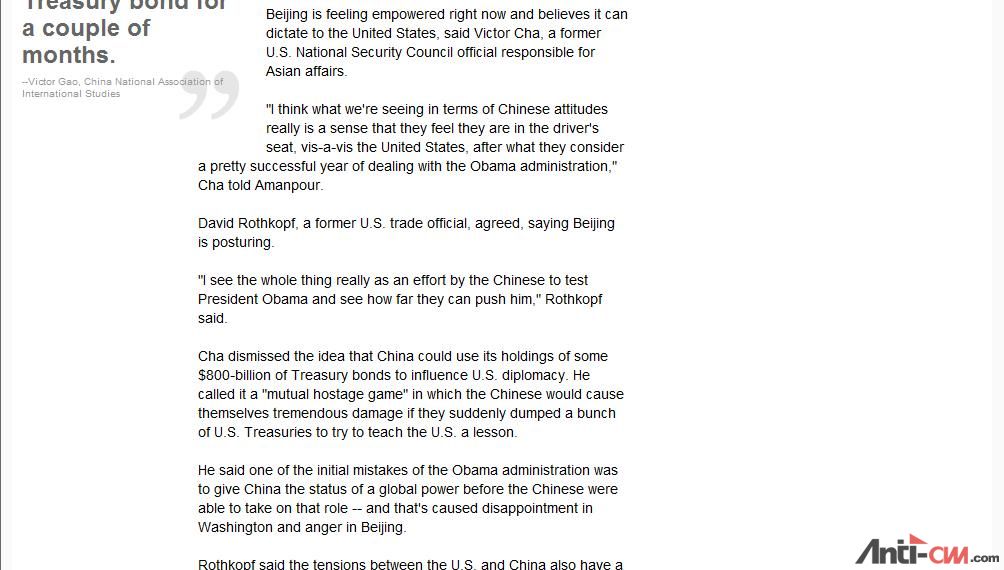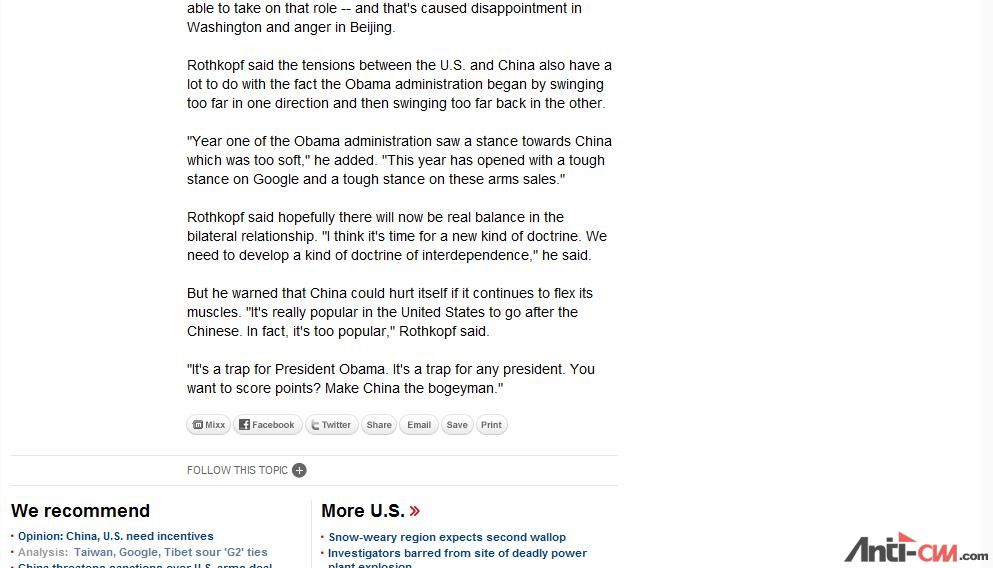|
|
【标题】Former Chinese official sees 'dark clouds'
【原文链接】http://edition.cnn.com/2010/US/02/04/china.relations/index.html
【时间作者】2010.02.05 Tom Evans
【正文】
(CNN) -- Declaring "I see a lot of dark clouds on the horizon," a former top official in the Chinese Foreign Ministry said the U.S.-China relationship is at a critical moment and any further deterioration will not be good for world peace.
Victor Gao, a director of the China National Association of International Studies, told CNN's Christiane Amanpour that China views the recent U.S. arms sale to Taiwan "as a major kind of a step to upset China's national interest."
Gao said U.S. President Barack Obama's decision to sell $6 billion dollars worth of weapons to Taiwan and to meet with the Dalai Lama in Washington this month are "miscalculations" based on a misreading of Chinese positions on what he called "these fundamental issues."
His comments came as U.S.-China relations are under increasing strain on a number of fronts, not just the issues of Taiwan and Tibet. There are also frictions over charges that China has hacked into Google, over trade relations, and over U.S. allegations that Beijing is manipulating the value of its currency to benefit Chinese companies.
But it's the Taiwan arms deal that appears to have upset China the most, even though Taipei has bought
U.S. weapons before, and Washington is not selling it new F-16 fighter jets on this occasion.
Taiwan -- which Beijing regards as part of its sovereign territory -- is buying what the U.S. calls "defensive weapons," including Black Hawk helicopters and Patriot anti-aircraft missiles.
In response, Beijing has taken the unprecedented step of saying it will impose sanctions against the U.S. defense contractors that will make the weapons.
Gao hinted at the possibility of even broader economic retaliation.
"China is now the largest creditor nation to the United States. Just imagine if China buys less of the Treasury bonds or stops buying the Treasury bond for a couple of months -- what it will mean for the national interest of the United States, but also for China because China itself will be hurt if China takes such extraordinary measures."
Gao also raised the possibility that Beijing will find it harder to cooperate with the U.S. on diplomatic issues such as Iran and North Korea. "On the one hand, the United States needs China's help; on the other hand, China is hurt because the United States displays a complete disregard for China's fundamental interests," he said.
Beijing is feeling empowered right now and believes it can dictate to the United States, said Victor Cha, a former U.S. National Security Council official responsible for Asian affairs.
"I think what we're seeing in terms of Chinese attitudes really is a sense that they feel they are in the driver's seat, vis-a-vis the United States, after what they consider a pretty successful year of dealing with the Obama administration," Cha told Amanpour.
David Rothkopf, a former U.S. trade official, agreed, saying Beijing is posturing.
"I see the whole thing really as an effort by the Chinese to test President Obama and see how far they can push him," Rothkopf said.
Cha dismissed the idea that China could use its holdings of some $800-billion of Treasury bonds to influence U.S. diplomacy. He called it a "mutual hostage game" in which the Chinese would cause themselves tremendous damage if they suddenly dumped a bunch of U.S. Treasuries to try to teach the U.S. a lesson.
He said one of the initial mistakes of the Obama administration was to give China the status of a global power before the Chinese were able to take on that role -- and that's caused disappointment in Washington and anger in Beijing.
Rothkopf said the tensions between the U.S. and China also have a lot to do with the fact the Obama administration began by swinging too far in one direction and then swinging too far back in the other.
"Year one of the Obama administration saw a stance towards China which was too soft," he added. "This year has opened with a tough stance on Google and a tough stance on these arms sales."
Rothkopf said hopefully there will now be real balance in the bilateral relationship. "I think it's time for a new kind of doctrine. We need to develop a kind of doctrine of interdependence," he said.
But he warned that China could hurt itself if it continues to flex its muscles. "It's really popular in the United States to go after the Chinese. In fact, it's too popular," Rothkopf said.
"It's a trap for President Obama. It's a trap for any president. You want to score points? Make China the bogeyman."
【全文截图】





|
Chinese, CNN, dark, former, official, Chinese, CNN, dark, former, official, Chinese, CNN, dark, former, official
评分
-
1
查看全部评分
-
|